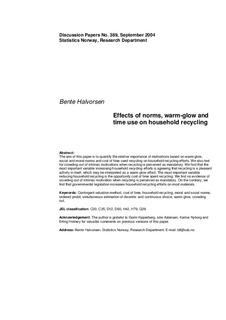Effects of norms, warm-glow and time use on household recycling
Working paper

Åpne
Permanent lenke
http://hdl.handle.net/11250/180433Utgivelsesdato
2004Metadata
Vis full innførselSamlinger
- Discussion Papers [1002]
Sammendrag
Abstract:
The aim of this paper is to quantify the relative importance of motivations based on warm-glow,
social and moral norms and cost of time used recycling on household recycling efforts. We also test
for crowding-out of intrinsic motivations when recycling is perceived as mandatory. We find that the
most important variable increasing household recycling efforts is agreeing that recycling is a pleasant
activity in itself, which may be interpreted as a warm-glow effect. The most important variable
reducing household recycling is the opportunity cost of time spent recycling. We find no evidence of
crowding-out of intrinsic motivation when recycling is perceived as mandatory. On the contrary, we
find that governmental legislation increases household recycling efforts on most materials.
Keywords: Contingent valuation method, cost of time, household recycling, moral and social norms,
ordered probit, simultaneous estimation of discrete- and continuous choice, warm-glow, crowding
out.
Utgiver
Statistics Norway, Research DepartmentSerie
Discussion Papers;No. 389Beslektede innførsler
Viser innførsler beslektet ved tittel, forfatter og emneord.
-
The impacts of alternative policy instruments on environmental performance. A firm level study of temporary and persistent effects
Bye, Brita; Klemetsen, Marit Elisabeth (Discussion papers;788, Working paper, 2014-10)We study the effects of various environmental regulations on environmental performance measured as emission intensity. Moreover, we aim to test whether any such effects are persistent or only temporary. Conventional theory ... -
The welfare effects of carbon policies: grandfathered quotas versus differentiated taxes
Bye, Brita; Nyborg, Karine (Discussion Papers;No. 261, Working paper, 1999)Recently, it has been demonstrated that pre-existing distortionary taxes can substantially increase the costs of market-based instruments which do not raise revenue, such as non-auctioned emissions quotas. Revenue-raising ... -
Labour market rigidities and environmental tax reforms : welfare effects of different regimes
Bye, Brita (Discussion Papers;No. 242, Working paper, 1998)The working of the labour market is important for the total welfare effects of tax reforms. This paper analyses, by using a computable general equilibrium model for the Norwegian economy, how different assumptions about ...